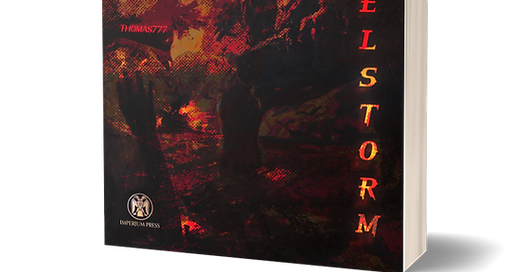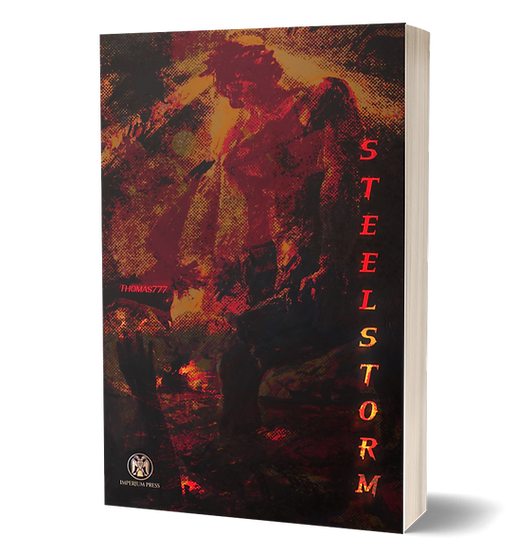Foreword: I am sorry for the delay in reviews, it’s been a crazy month or two with two deaths in the family, lots of funerals and travel, and some very busy business with my freelance writing endeavors. Special thanks to friends of mine who have been pitching in with guest reviews of good books they’ve read recently, such as Enoch, Elrond, Tomas, etc. Without further ado, here’s Steelstorm, written by Thomas777(@REAL_7homas777) and published by Imperium Press https://www.imperiumpress.org/
Steelstorm, with a sequel released in January, is sort of difficult to classify. It’s something of a Cold War infused speculative science fiction short story. The story jumps in timelines between depraved junkie and serial killer Billy Wong around 1983, and the story of Victor Von Leers, a soldier in a dystopic far flung future in the year 3000.
On that day, Remer had walked with Maltsev in the garden, and had gifted him a leatherbound book, inscribed by its author: a theorist of Jihad, of political philosophy, of the histories of the races of men, all and sundry. Remer knew by his own leendary intuition that his comrade was an occulted Muslim. He knew what sort of appeal would fortify Maltsev to execute an order diabolical in consequene if not in deed, an order that would realize what up till then had only been speculation on the outcomes of game simulations-outcomes numeric and sanitized by euphemism.
Remer had divined Maltsev’s frailties-only an appeal to serve God unconditionally, issued forth by a killer of unimpeachable faith, could let Maltsev rationalize that within days his executive decision would culminate in hundreds of millions of the Mega-Dead. God’s will was Armageddon: to prostrate oneself before it was piety; anything else was cowardice and complicity in one’s own damnation.
The story switches around frequently, explaining this alternate world around the perspective of the day of all days, WARDAY, which in this case is a Soviet and American nuclear exchange that takes place at the end of 1983. All nations and most human life is extinguished, and by Von Leers time in the year 3000, humanity has rebuilt itself and begun to conquer (and wage war) among the stars.
All of history up to the moment of his conception had conspired to create Victor. It caused his father to be garrisoned to an off-world killing field, a forlorn outpost where the man was gifted a terrified, virginal woman-child by her even more terrified mother and father, refugees fleeing a tsunami of murder perpetuated by a lumpen caste of doomed cannibals, sex fiends, and diagnosed Terminals. Terminals were a mysterious and ever-present horror on any world or station where the diaspora of man lived, died, labored, or made war in deep space.
Naked, perpetually encrusted with blood and excreta, some holding severed heads aloft as trophy-totems, a smattering of self-anointed Shaman among them adorned with necklaces of ears and noses, fingers and toes, snatches and severed breasts, virtually all of them poisoned by radiation, their burned flesh emitting an odiferous bouquet of ozone, cinnamon, and decay. This epidemic emergence on the soil of Alpha Akron had guaranteed that virtually every one of the 31,403 Off World settlers would perish at the hands and teeth of the Terminals.
It’s often a major challenge for an author to do multiple simultaneous timelines and perspectives, while still keeping them coherent. Thomas manages this pretty well however, and the juxtaposition between the Billy the psychopathic Junkie and Von Leers doesn’t feel jarring at all and keeps the book feeling fresh between chapters.
Billy Wong was the son of a doomed Nung Chinese mercenary whose destiny was to be unceremoniously slaughtered by teenage executioners in the blind service of the Khmer Rouge. His mother was a Montagnard woman-child. Much later in life, as she entered middle age in a land as barbaric in its own way as the land of her birth, she came to believe that Lucifer had been granted ingress to her body and to this world when she had been impregnated by Billy’s father. Probably, she reasoned, as punishment for the grave sins committed against God and man by the latter, sins that cried to heaven for vengeance, sins so depraved that even Billy’s father meeting the Creator upon being blinded, castrated, and skinned alive by the Red Khmer could not be sufficient atonement.
Of the currently featured movies, BIlly’s favorite was Halloween II. In recent days, Billy had viewed the double bill of Halloween II and The Exterminator no fewer than four times, finding the former particularly stimulating from the realism of the murder scenes coupled with the fact that the actresses were frequently nude, but by the time The Exterminator played following the intermission reel change, he could often be found slipping into a narcotic stupor. Billy did not find narratives of revenge driven violence cathartic, violence without sex was an aesthetic nullity, something that appealed to vulgar dilettantes, in his estimation. Billy considered himself an aesthete, a romantic, and a student of murder, the taking of life constituting a zenith of human experience, something that could not be extricated from its self-contained merits. Any man who had to couch his bloodlust in a redemptive moral narrative or to extricate the act from its underlying eroticism was a man unworthy of the experience.
It’s difficult to describe exactly why, but I’m enamored with Thomas prose and skill as a writer. The scenes are weird, in a good way. They are different and the writing has a very unconventional but satisfying feel to it. It’s like trying a sample-size of something exotic and being pleasantly surprised at the taste. I also had one last passage from the book that was particularly poignant in the way Thomas expressed in his author insert at the end. This really struck a chord with me:
What is less controversial is the suggestion that the novel, incidentally, Walker Percy referred to the novel as the last “sovereign” art form, and thus a medium uniquely accessible to American audiences, and the novelist brings something essential to political discourse in conceptual terms. A well-structured, lovingly crafted philosophical novel can provide the reader with an experience of fantastic vistas that are both remote and unknown, yet intimately relatable and implicitly familiar. Such fantastic settings not only are cathartic, nobody need feel ashamed of their need for occasional escapism so long as it does not become an essential coping mechanism, but they provide for the exploration of values, ideas, motifs, and aesthetic renderings without resorting to pedantic abstraction or absence of plausibly human ontologies.
The book is short, at about 85 pages. At 20 dollars on Amazon for the paperback version, it’s also a bit expensive for its length. But at the same time it’s a very interesting book. Thomas writes with a vibe and prose that feels like it’s from another era, another time, and for such a short book it conveys some very grand imagery with ease. If it’s in your budget and you want to read something different and thought provoking, I really recommend Steelstorm. It’s an incredibly satisfying read.
Check out Steelstorm on Amazon here
Or purchase Steelstorm (and Steelstorm II) directly from Imperium Press at this link






I read this one over the Christmas holiday and my copy is boxed away right no so I can't pull any quotes. But you included one of the good ones: "All of history up to the moment of his conception had conspired to create Victor." It read like someone saying to Cormac McCarthy "describe the Kwisatz Haderach in one sentence." And that's how I would describe this. McCarthy writing Dune but with a word limit.
I was going to say something about it being set in the Warhammer 40k universe but I have not read any of the Warhammer novels so I shouldn't try to speak to that. And anyway McCarthy brings enough grimdarkness on his own. No knock against the author to describe his work in terms of the work of the greats. As ol' Cormac says, books are made out of books. Blood Meridian was really just the novelization of a kid's diary after all. Anyway. I'll get the sequel but I don't quite think Steelstorm nailed the execution. Thomas777 was aiming very high and coming up a little short is better than aiming low.
His prose feels like Quentin Tarantino: low-culture, incredibly confident and aggressively in-your-face, with a surprising amount of style and thought behind it. Sex, violence, sleaze, disease, cruelty, disgust... a Nietzschean predator's view of the underbelly of life.
It feels very weird because normally this amount of style and planning is reserved only for "high-culture" glamorous escapism, and good artists tend to be embarrassed to write about these themes under their own names. So the automatic heuristic is to say "low-culture means low-quality" and then something like this book comes along and breaks the pattern.
Loved your review!